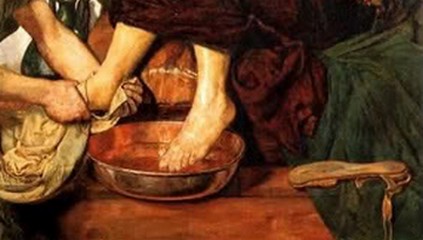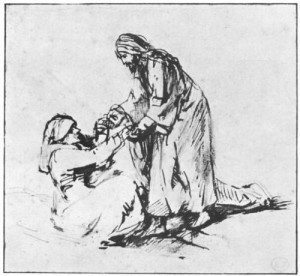====================
A sermon offered on Maundy Thursday, April 2, 2015, to the people of St. Paul’s Episcopal Church, Medina, Ohio, where Fr. Funston is rector.
(The lessons for the day are Exodus 12:1-14; Psalm 116:1,10-17; 1 Corinthians 11:23-26, and John 13:1-17,31b-35 [all of Ch. 13 was read]. These lessons can be read at The Lectionary Page.)
====================
 Every year on Maundy Thursday in the Episcopal Church we do this thing: we gather for Eucharist and we hear these lessons – the story of the Passover from the Book of Exodus, St. Paul’s retelling of the institution narrative of the Eucharist, and St. John’s story of the Last Supper in which he focuses not on the meal but on Jesus’ act of humility and service during the meal (probably quite early in the evening) of washing the feet of the others present.
Every year on Maundy Thursday in the Episcopal Church we do this thing: we gather for Eucharist and we hear these lessons – the story of the Passover from the Book of Exodus, St. Paul’s retelling of the institution narrative of the Eucharist, and St. John’s story of the Last Supper in which he focuses not on the meal but on Jesus’ act of humility and service during the meal (probably quite early in the evening) of washing the feet of the others present.
In many parishes the liturgy of this evening will include a formal washing of the feet of selected participants by the presiding priest and others. You may have seen pictures or video of the Pope doing so in the Vatican’s celebration of this feast. We’ve broadened that practice to allow any who wish to follow Jesus’ example to do so during the Agape Feast. There are foot washing stations in the Parish Hall for that purpose.
Why did Jesus wash his disciples’ feet? Tradition (as I just mentioned) tells us that it was to display and model humility and servanthood. In First Century Palestine, sandals were the most common form of footwear. Walking the dusty desert roads made one’s feet filthy; it was imperative that that be washed before a communal meal. In those days, people didn’t sit on chairs to eat at a table. Instead, they reclined at low tables; feet were very much in evidence. When Jesus rose from the table and began to wash the others’ feet, he was doing the work of the lowliest of servants. The disciples must have been stunned by this act of self-effacement and condescension. The humility expressed by this action with towel and basin foreshadowed Jesus’ ultimate act of humility on the cross.
Although the Lectionary only requires that we read certain verses of Chapter 13 of John’s Gospel, I
chose to read the entire chapter because I think tonight we need to remember exactly whose feet Jesus washed. When we read only that he washed “the disciples’ feet” we can gloss over and forget that John makes it very plain that among that group were two who, to our modern minds, clearly did not deserve the honor: Judas, who would betray him, and Peter, who would deny him. And John also makes it very clear that Jesus knew that both of them would do what they ultimately did.
I think it is important that we note that in particular this year, this Holy Week because for the past several days we have all heard a great deal about something called the Religious Freedom Restoration Act, something that was passed 25 years ago by the federal government and versions of which have been adopted in several states, most recently next door to us to the west in the State of Indiana. The law recently passed in Indiana, though it bears the same name as the federal act, is not the same as the federal law. During the past 25 years various state and federal courts have interpreted and to some extent limited the application of the federal or similar state laws, and so later-enacted versions have tried to answer and overcome those judicial limitations, Indiana’s (and now a nearly-identical act in Arkansas) being the broadest.
The impetus for these laws, of course, is the growing legal acceptance of marriage equality, the movement to allow same-sex couples to contract civil marriage in the same way as opposite-sex couples. Indeed, Professor Garrett Epps, who teaches Constitutional Law at the University of Baltimore, has said of the Indiana law that it is clear that its purpose is
. . . to be used as a means of excluding gays and same-sex couples from accessing employment, housing, and public accommodations on the same terms as other people. True, there is no actual language that says, All businesses wishing to discriminate in employment, housing, and public accommodations on the basis of sexual orientation, please check this “religious objection” box. But, as Henry David Thoreau once wrote, “Some circumstantial evidence is very strong, as when you find a trout in the milk.” (What Makes Indiana’s Religious-Freedom Law Different?, The Atlantic, March 30, 2015)
And the Rev. Franklin Graham, the son and heir of the Dr. Billy Graham, specifically extolled the Indiana act as “a religious freedom bill that would protect [Christian] business owners who want to decline to provide services for same-sex marriages.” (Facebook posting, March 25, 2015, 10:39 am)
And that is why I think it important that we specifically name Judas and Peter as being among those before whom Jesus knelt in abject humility and washed their feet. Presumably those ‘Christians (about whom Mr. Graham spoke) [want] to live out their faith’ and follow Jesus Christ by refusing to serve those whose actions they find offensive. The problem with that is that Jesus didn’t refuse to serve those whose actions were not only offensive to him; their actions were downright fatal to him! He didn’t refuse to serve them; he knelt in humility and washed their feet!
In answer to Mr. Graham, another Baptist preacher, the Rev. Russ Dean, co-pastor of Park Road Baptist Church in Charlotte, NC, wrote these words in Baptist News Global:
Mr. Graham opposes same-sex marriage. Maybe he also thinks women should stay home with their kids, and not work outside the home. Some Christians believe this, too. Maybe Indiana should also defend an employer’s right to decline employing young mothers? Whose religious views will we defend? Whose won’t we defend? And where will it stop?
Religious freedom is one of the principles that defines the genius of America – but only a secular state can actually defend that principle for all of its citizens. Otherwise, we might have Indiana defending conservative Christian views and another state defending liberal Christian views; one state defending Sharia law and another writing the codes of Leviticus into the law books in favor of a Jewish majority.
What this means, of course, is that some Christian business owners may have to break the law to defend their religious convictions. (Some Christian business owners did just that when Jim Crow was the law of the land.) But when Christians, or adherents of any religion, go into business, the secular law of the land rules. I have no doubt that in the coming months gay marriage will be the law of the entire land, so some Christian business owners will have a decision to make: uphold the law, or defend their understanding of one religious conviction — and suffer the consequence of breaking that law.
But let the government keep its hands out of religion. When the day comes that Christians have no other way to motivate religious conviction than through legislation, secular government will be the least of our worries. (Why do so many Christians think we need government to prop up Jesus?, Baptist News Global, April 1, 2015)
My purpose tonight is not to debate the merits or demerits of marriage equality; like the Rev. Mr. Dean, I believe that in the not-too-distant future same-sex marriages will be legal throughout the country, but whether that is or is not the case is irrelevant at the moment. What is relevant is how we as followers of Jesus Christ relate to and interact with those who are different from us in whatever way and for whatever reason, so different that, in fact, we find them or their actions offensive. What is relevant is this: do we respond to them with arrogance and condescension, enacting laws that some have gone so far as to call “a license to discriminate,” or do we embrace them in humility and love, kneeling down to wash their feet? Do we try to motivate religious conviction by enacting secular legislation or do we do so the way Jesus did, by example?
“Do you know what I have done to you?” Jesus asked Judas and Peter. “If I . . . have washed your feet, you also ought to wash one another’s feet. . . . If you know these things, you are blessed if you do them.” Judas failed utterly and committed suicide when he realized it; Peter failed, as well, but was forgiven and eventually taught the church “that God shows no partiality” and that “everyone who believes in [Jesus] receives forgiveness of sins through his name.” (Acts 10:34,43)
We call this day “Maundy Thursday” from an old English word meaning “commandment” because, after demonstrating what it means by washing their feet, Jesus admonished the Twelve, and through them admonishes us: “I give you a new commandment, that you love one another. Just as I have loved you, you also should love one another. By this everyone will know that you are my disciples, if you have love for one another.”
May the world know that we are his disciples because, in everything we do, we do not stand in arrogance and condescension, but rather we kneel in humility and love before others, even those who differ greatly from us, even those who offend us.
Steve Garnaas-Holmes, United Methodist pastor and poet, recently published this poetic prayer with which I will close:
Lord, what was it like to wash Judas’ feet,
on your knees, with such tender kindness?
An act of love, not irony.What is it like to so humbly serve me,
to kneel at the feet of my failure and betrayals,
to welcome and wash and soothe me
as if I am your master?
Pure love, without demand.Give me this love, this gentle humility,
to wash the feet of those who oppose me,
to treat them with tender kindness,
to seek always to be closer to you,
on your knees below us all,
serving in perfect love.
(Found at the poet’s Unfolding Light blog)
Amen.
====================
A request to my readers: I’m trying to build the readership of this blog and I’d very much appreciate your help in doing so. If you find something here that is of value, please share it with others. If you are on Facebook, “like” the posts on your page so others can see them. If you are following me on Twitter, please “retweet” the notices of these meditations. If you have a blog of your own, please include mine in your links (a favor I will gladly reciprocate). Many thanks!
====================
Father Funston is the rector of St. Paul’s Episcopal Church, Medina, Ohio.
 The four evangelists are traditionally represented by iconic depictions of the emphasis of their gospels. John, whose gospel is the longest and most different of the four tellings of Jesus’ story, is represented by an eagle because he emphasizes the divinity of Christ. Matthew, on the other hand, begins his gospel with Jesus’ genealogy and emphasizes the humanity of the Savior, so he is represented by a man. Luke emphasizes the sacrificial nature of Jesus’ ministry and mission; thus, he is represented by an ox or bull (often winged), the sort of animal offered in the Temple.
The four evangelists are traditionally represented by iconic depictions of the emphasis of their gospels. John, whose gospel is the longest and most different of the four tellings of Jesus’ story, is represented by an eagle because he emphasizes the divinity of Christ. Matthew, on the other hand, begins his gospel with Jesus’ genealogy and emphasizes the humanity of the Savior, so he is represented by a man. Luke emphasizes the sacrificial nature of Jesus’ ministry and mission; thus, he is represented by an ox or bull (often winged), the sort of animal offered in the Temple. Today is the Third Sunday in Lent but, being March 8, it is also the day set aside on the calendar (both that of the Church of England and that of the Episcopal Church) for us to remember a hero of the Anglican tradition, a World War I chaplain named Geoffrey Anketell Studdert-Kennedy. In 1914 he became the vicar of St. Paul’s, Worcester, UK, but a short while later, on the outbreak of war, Kennedy volunteered as a chaplain to the armed forces. He gained the nickname “Woodbine Willie,” for his practice of giving out Woodbine brand cigarettes to soldiers. In 1917, he won the United Kingdom’s Military Cross for bravery at Messines Ridge.
Today is the Third Sunday in Lent but, being March 8, it is also the day set aside on the calendar (both that of the Church of England and that of the Episcopal Church) for us to remember a hero of the Anglican tradition, a World War I chaplain named Geoffrey Anketell Studdert-Kennedy. In 1914 he became the vicar of St. Paul’s, Worcester, UK, but a short while later, on the outbreak of war, Kennedy volunteered as a chaplain to the armed forces. He gained the nickname “Woodbine Willie,” for his practice of giving out Woodbine brand cigarettes to soldiers. In 1917, he won the United Kingdom’s Military Cross for bravery at Messines Ridge. After I did my first sermon-prep read through of this morning’s gospel I thought, “There are two stories here.” Then I thought, “No, there are three.” And then I realized that there are really more stories here than I can count.
After I did my first sermon-prep read through of this morning’s gospel I thought, “There are two stories here.” Then I thought, “No, there are three.” And then I realized that there are really more stories here than I can count.  When Philip told Nathanael that he had found the Messiah and that he was the son of a carpenter from Nazareth, Nathanael’s immediate response was, “Can anything good come from Nazareth?” (Jn 1:46). Obviously Nazareth had a reputation, and not a good one. I often wonder if, as Jesus was making his way through the Holy Land, especially early in his ministry when he wasn’t well-known, people would ask him, “What was it like growing up in Nazareth?”
When Philip told Nathanael that he had found the Messiah and that he was the son of a carpenter from Nazareth, Nathanael’s immediate response was, “Can anything good come from Nazareth?” (Jn 1:46). Obviously Nazareth had a reputation, and not a good one. I often wonder if, as Jesus was making his way through the Holy Land, especially early in his ministry when he wasn’t well-known, people would ask him, “What was it like growing up in Nazareth?” I often wonder what (if any) thought went into the construction of various lectionaries, particularly the Daily Office lectionary of the Episcopal Church. Are the sometimes strange, sometimes enlightening, often puzzling juxtapositions of texts planned or simply fortuitous?
I often wonder what (if any) thought went into the construction of various lectionaries, particularly the Daily Office lectionary of the Episcopal Church. Are the sometimes strange, sometimes enlightening, often puzzling juxtapositions of texts planned or simply fortuitous?  I don’t know what to do about Israel and Palestine. Apparently no one knows what to do about Israel and Palestine. There is so much bitterness and emotion on both sides and from all quarters that no one can even talk about Israel and Palestine.
I don’t know what to do about Israel and Palestine. Apparently no one knows what to do about Israel and Palestine. There is so much bitterness and emotion on both sides and from all quarters that no one can even talk about Israel and Palestine.  Paul often ends his correspondence with these requests that the readers convey his personal greetings to specifically named people. I often find myself skimming those parts of the reading, just passing quickly over them. But, also, I often find myself pausing at these names, wondering about them. Who were they? What did they do in their daily lives? How is it that Paul was personally acquainted with them?
Paul often ends his correspondence with these requests that the readers convey his personal greetings to specifically named people. I often find myself skimming those parts of the reading, just passing quickly over them. But, also, I often find myself pausing at these names, wondering about them. Who were they? What did they do in their daily lives? How is it that Paul was personally acquainted with them? I sort of remember something from New Testament class at seminary that Paul would compose his letters by dictation to a secretary and then add greetings in his own handwriting. What I can’t remember is whether this verse (which seems such a strange intrusion into the text of the letter to the Galatians) in which he comments on the quality of his penmanship is taken by scholars to be proof of genuine Pauline authorship or as evidence that the letter wasn’t truly written by him. I know it’s one or the other. Whatever . . . it’s in the accepted canon of the New Testament.
I sort of remember something from New Testament class at seminary that Paul would compose his letters by dictation to a secretary and then add greetings in his own handwriting. What I can’t remember is whether this verse (which seems such a strange intrusion into the text of the letter to the Galatians) in which he comments on the quality of his penmanship is taken by scholars to be proof of genuine Pauline authorship or as evidence that the letter wasn’t truly written by him. I know it’s one or the other. Whatever . . . it’s in the accepted canon of the New Testament.

